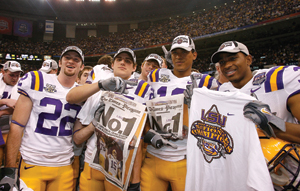The winner of tonight’s BCS championship game between LSU and Alabama will hold more than a crystal trophy after the game. They’ll have their hands cupped to collect the millions in additional revenue that a national championship can bring.
|
| Staff writer Michael Smith talks about how playing in the national championship game will affect the fortunes of LSU and Alabama. |
Championships mean dollars in college sports, especially football titles. And in an era of state funding cuts and tighter budgets, every dollar counts.
Just look at the history. Before LSU won its first BCS championship in 2003, the school had never grossed more than $1 million in licensing revenue. After winning the title, the Tigers’ licensing income for the 2003-04 fiscal year jumped a staggering 208 percent to almost $3 million. By the time the Tigers won again in 2007, they were grossing more than $5 million in licensing.
 |
Both of the title game contenders have experienced the benefits of a national championship season recently, LSU in 2007 (above) and Alabama in 2009.
Photos by: GETTY IMAGES
|
The fact that LSU and Alabama (2009) both have won titles in recent years might limit the financial impact of another championship, but there will be incremental value in licensing, sponsorship and advertising.
“With all of the excitement in the fan base and corporate base from winning a championship comes additional radio, additional advertising, a longer season, more games,” said Doug Paschal, vice president and general manager of CBS Collegiate Sports Properties, which owns LSU’s multimedia rights. “You’re also strengthening brands that already are
very strong.”
Licensing is the one area where either Alabama or LSU might see an immediate boost in revenue from another BCS title. Collegiate Licensing Co. is the licensing agent for both schools.
The Crimson Tide’s marks already are among the most valuable in college sports. They ranked second on CLC’s list of schools that sold the most merchandise in 2011, behind only Texas. LSU ranked ninth.
Auburn, by comparison, leaped from 15th to fourth in CLC’s rankings in 2011 after its national title last season.
For schools like those that already generate $5 million to $6 million a year or more in royalties, a national title typically equates to $1 million to $2 million in additional revenue, said Brian Hommel in LSU’s trademark licensing department.
Additional revenue in marketing and media deals are often less apparent so quickly.
“The year in which the school wins a championship, you’re not going to see as much of a lift,” said Cathy Weeden, vice president and general manager of IMG College’s property at Florida, which won BCS titles in 2006 and ’08. “You’re more likely to see the lift in subsequent years because the championship has reinforced the premium qualities about the brand, and businesses want to tap into that. But it’s something that’s built over time, not so much year over year.”
Both Alabama and LSU outsource their multimedia rights — CBS Collegiate Sports Properties has LSU’s rights; Learfield Sports has Alabama’s.
LSU’s deal guarantees the school an average of $7.5 million a year, while Alabama makes at least $7.6 million annually. If CBS or Learfield hit certain sales thresholds, they share revenue with the school.
Alabama made $9 million last year from its guarantee and revenue share combined. The top money-making schools from multimedia deals are Texas, Ohio State and Florida, each of which pull in more than $10 million annually.
Rights holders make incremental revenue in championship years from the additional games that schools play. CBS Collegiate Sports Properties would have budgeted sales revenue for LSU’s 12-game football season, but throw in the SEC championship game and the BCS title game and those two games add up to more radio, more TV and more advertising inventory to sell.
There’s also the opportunity for commemorative books and DVDs that can drive revenue. After last season’s championship, Auburn teamed with XOS Digital and TCG Productions to produce and distribute “2010 National Champions,” a DVD box set of 13 discs with each game from the Tigers’ season for $99.
“There’s some opportunity there for postseason revenue, but you’re talking in the hundreds of thousands, not millions,” said Tom Stultz, a former IMG College executive and Host Communications CEO. “In a championship year, most of what’s sold is sold already. As a rights holder, there’s more lasting value in building the brand and capitalizing on that with long-term deals.”
Rights holders say they don’t typically invoke big rate hikes after a championship, but there can be alterations to categories. It wouldn’t be uncommon for a rights holder, for example, to break up the auto category into domestic, foreign and trucks to increase sponsorship opportunities and revenue potential for a hot property.
Many advertising contracts stipulate that if a school plays extra games, such as a BCS championship game, advertisers are obligated to continue buying.
“Rates don’t really change all that much, but you want to make the buying opportunities available to as many people as possible,” Paschal said.
BCS National Championship Game
The Business Tale of the Tape
| |
Alabama |
|
LSU |
| 2011-12 total athletic budget (rank) |
$100 million (5) |
|
$91 million (9) |
| Football revenue (rank) |
$76.8 million (2) |
|
$68.5 million (9) |
| Football expenses |
$31.6 million |
|
$21.5 million |
| Head football coach |
Nick Saban |
|
Les Miles |
| Head coach’s salary |
$4.8 million |
|
$3.9 million |
| Total salary for all football coaches (rank) |
$8.5 million (2) |
|
$7.6 million (10) |
| Multimedia rights partner |
Learfield |
|
CBS Collegiate Sports Properties |
| Avg. annual multimedia guarantee |
$7.6 million |
|
$7.5 million |
| Stadium |
Bryant-Denny Stadium |
|
Tiger Stadium |
| 2011 avg. attendance (rank) |
101,821 (3) |
|
92,868 (7) |
Sources: Schools; U.S. Department of Education; USA Today





